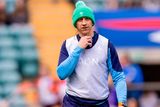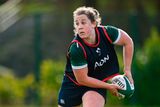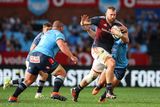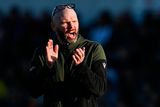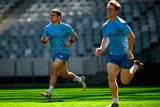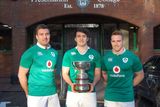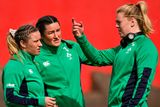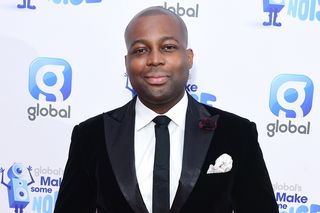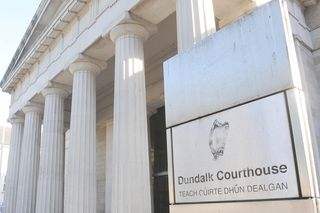The man behind the mask
Biarritz captain Imanol Harinordoquy wearing a mask during his side's defeat of Munster in the semi-finals of the Heineken Cup
THE All-Ireland League may seem a strange port of call when seeking comparisons for this evening's all-French Heineken Cup final in Paris but for Biarritz-Toulouse 2010, read Young Munster-St Mary's 1993.
Munsters were the 'Cookie Monsters' or simply 'Cookies', an unfashionable club from an area that felt disenfranchised and disregarded in Irish rugby, and a team who played boot-bollock-and-bite rugby at their Tom Clifford Park home -- commonly referred to as 'The Killing Fields'.
They travelled to Dublin in their thousands to take on Mary's, a club founded on the traditional bedrock of schools rugby, and the yellow and black hordes roared their grizzled heroes to a famous Lansdowne Road victory and an AIL title.
Biarritz and their supporters journey to Paris with similar motivations today. The south west of France may be the spiritual home of French rugby but Biarritz are arriving to represent the Basque region, an area that regards itself as an independent nation traversing the border with Spain and one desperate to make a powerful statement in the French capital.
The fact they are playing Toulouse, another old-school club situated three hours down the road (although not a Basque-based outfit), and not the Parisien glamour-boys of Stade Francais makes no difference: this is Basques against the rest.
Biarritz's eagerness to push the Basque button is a source of deep irritation to other clubs in the region, notably Bayonne, who believe this is a contrived tactic to increase the club's marketability and point to the lack of Basque natives in the Biarritz squad.
This is true in that the player roster is made up of a clutch of foreigners from England, America, South Africa and New Zealand, next to Frenchmen with no links to the Basque area.
However, their supporters -- the most vocal in French rugby -- are Basque to the core and hold up one Biarritz player as the sporting figurehead of this deeply proud and driven region.
Imanol Harinordoquy was born in Bayonne in February 1980 and grew up playing a variety of sports including the traditional Basque pastime of pelota (a sort of cross between handball and lacrosse).
He concentrated on rugby from his mid-teens on and played for Pau in the French league before switching to Biarritz in 2004.
The career stats speak for themselves. Breaking into the French team when still only 21, he formed a magical back-row alongside Serge Betsen and Olivier Magne that spearheaded their Grand Slam triumph in 2002, picked up another Slam in 2004 and was phenomenal from No 8 this season as the French swept the boards again.
The trophy cabinet also contains two Top 14 titles with Biarritz and a further Six Nations victory with France in 2007.
Enigmatic
So much for the medals: the Harinordoquy story is rooted in an intriguing and enigmatic character that has augmented his exploits on the rugby pitch.
He comes from a cattle background and, though a full-time professional, sees rugby as something he does in his spare time, going through a period of signing one-year deals in case he decided to walk away from the game.
Defined by his Basque heritage, Harinordoquy also harbours a deep dislike for all things English and is not slow to voice his disdain.
"The only memories I have of England and the English are unpleasant ones," he once said. "They are chauvinistic and arrogant, they look down on everybody."
Big talk requires big actions to back it up and Harinordoquy has not disappointed for, while acknowledging the athleticism, pace, skilful hands and physicality of one of the world's finest No 8s, if there is one quality that defines him, it is bravery.
It was a privilege to witness his performance with a broken nose and broken ribs in the semi-final win over Munster. The man had no right to be playing, was wearing a ridiculous face mask necessary to protect the nose that had been operated on the previous week and required treatment on four occasions for the damage sustained to his ribs.
Yet, Harinordoquy would not leave the pitch until Dimitri Yachvili kicked Biarritz ahead for the first time and the No 8 departed to an incredible ovation from the Biarritz faithful.
The only comparable display that springs to mind is Ireland flanker Philip Matthews playing for almost 60 minutes with a dislocated shoulder in the torrid 15-15 draw with France in 1985. The Ulsterman realised the only available substitute was prop Mick Fitzpatrick and played with one arm until he could go on no longer.
Harinordoquy is made of the same stuff. The ribs are still cracked but he scoffed at the notion that they might rule him out of today's final.
Toulouse go in as overwhelming 2/7 favourites but the fact Harinordoquy is 7/1 favourite to scoop the man of the match award tells its own tale.
There was a lull period in his career a couple of years ago where Harinordoquy was referred to as "Harry Ordinary" in the English press (this coming from the rugby nation that thinks Nick Easter is in the same class and that Matt Banahan and Duncan Bell are international standard).
Today should be another opportunity to review why the only time the word 'ordinary' should be applied to the Basque No 8 is if it comes with 'extra' attached.

